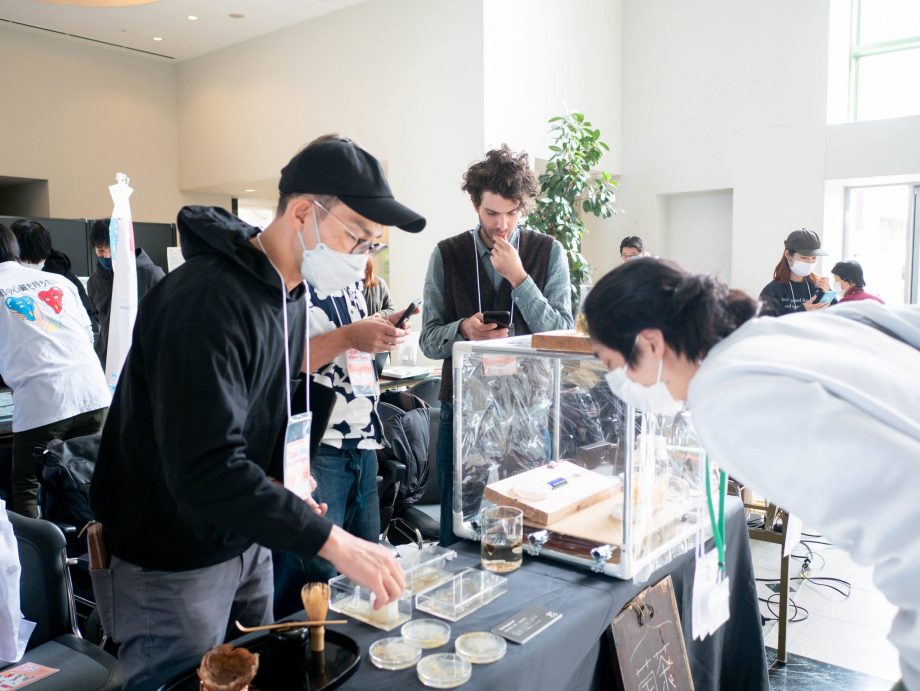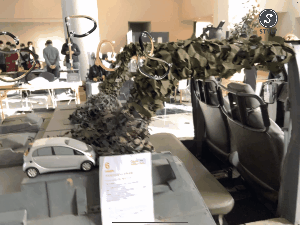Event report
January 29, 2023
FabCafe Global Editorial Team
On the 3rd and 4th of Dec 2022, SPCS (pronounced species) participated in the Ogaki Mini Makerfaire (OMMF) as an exhibitor. Prototypes from Season 1 of SPCS, led by George Tremmel, were displayed over the weekend. Here’s a recap from Sarah Ho.
A mini maker faire is a local community-organized version of the larger Makerfaire that gathers makers from different fields ranging from electronics and robotics to art and design to showcase and celebrate the spirit of DIY. Ogaki city in Gifu prefecture has been organizing mini maker faires biannually since 2010, and this year marked the 7th Mini Maker Faire in Ogaki city.


This year’s OMMF was held concurrently in the Metaverse! The 2D venue created in Gather was kept open to the public even after the event, ensuring that those who could not make it in person could still enjoy the faire.
Related Links:
Exhibitor list:
The online venue you can still visit after OMMF:
Exhibits ranged from the digital to the analog, created by a wide range of makers of all ages. From a skater musician who combined his passions into a skateboard instrument, to a father who created a party light trampoline for his children, the faire showcased the magic of DIY creation in bringing even the most fantastical ideas to life.

(Clockwise from top left) A mini pen-plotter, Cognitive gradation (1) -イシウカス- a projection mapping project. Kakkin (skate instrument) is a working prototype skateboard – electric guitar mash-up. Orihime – A material that bends and folds according to the electricity moving along the circuitry along the film.

Even without an official booth, enthusiasts could also carry around their creations to show other visitors!
This year’s OMMF was divided into two spaces, the third floor showcased many digital projects, while the first floor housed many non-electronic projects such as unusual analog instruments and even a 1/1 model of a model jeep kit. This was also where the SPCS booth was located, alongside the Bioclub booth.
SPCS
SPCS (pronounced species) is a series of programs that aims to explore design and new forms of expression with the help of nature. Through workshops and prototyping, participants can view once unpredictable and uncontrollable biological phenomena through a new lens.
Find out more about SPCS here: https://fabcafe.com/jp/labs/kyoto/spcs/

The prototypes which started as mere ideas in the first SPCS workshop.
Season 1 of SPCS explored the big question “What is Life?” with bio-artist George Tremmel through DIY bio workshops. By the end, participants were to come up with an idea for a work of art, using the DIY bio skills and hints from the workshop, and combining it with their own interests and passions. Their ideas would then be presented at OMMF, or exhibited if they had reached the prototyping stage.
Kazutoyo Takada works as a STEAM education developer at Panasonic on weekdays and enjoys a cup of tea outdoors in his free time. When he first learned about kombucha scoby (the Japanese name for kombucha literally translates as tea fungi) he was more fascinated about the idea that pouring tea into a cup made of scoby would mean dousing it in a growth medium, rather than the sustainable properties of scoby leather. Wouldn’t it be cool to have a cup regenerate as you drink from it? This is only his first prototype and we look forward to one day enjoying a tea ceremony with his scoby teaware.

「The Everlasting Cup」

Process shots of growing the kombucha with his son over two months. It seems the house constantly smelled sour the whole time.
Product designer Shinya Hasebe designed The Playground for the believably intelligent slime mold. How slime mold moves in search of food has attracted attention in a variety of areas, such as in design and behavioral analysis. However, most of these interesting experiments have been conducted on flat culture mediums.Together with another member from season 1 – Hiroshi Mitachi, founder of Shinkougeisha, Hasebe explored a variety of methods to create a three dimensional medium the slime could grow upon. This included 3D printing, injection molding and sculpting with wire mesh and covering the structures with agar as a medium.
In the prototype’s current iteration, the slime mold was found to move very little and would not enter the “playground”. What will become of Hasebe’s prototype after this?.

The Playground is an experiment in growing slime mold on 3D forms instead of 2D petri dishes.
Hasebe creating a SPCS sign over the SPCS booth using his AR experience called World’s Palette that was a finalist in the NEWVIEW AWRDS2021
Fungicha is a project aiming to connect with nature by collecting, cultivating and making tea from mushrooms. The team put together a mini incubator and a cold brew mixing machine for OMMF. At first glance, what seems like a single wooden board turns into a cold-brew machine, with the help of magnetic mixing pellets.

The magnetic cold-brew mixing board by Fungicha

Fungicha team member Thomas trying out the mixed mushroom tea on the spot

Many visitors were initially drawn in by the spectacle of mushrooms spinning through beakers and ended up fascinated by the scoby teaware. We even had visitors asking where they could buy mold and scoby themselves!
Exhibitors were also given the opportunity to present their projects on the first day of OMMF..
You can find SPCS’s presentation recorded below!
https://youtu.be/U21SsDDyM9U?t=1720

Pictured here is Nami Urano giving a talk on SPCS (left) and members of the BioClub (right) presenting. The BioClub also exhibited the final projects from BioHack Academy which took place from March to June 2022.

George Tremmel, BioClub director and SPCS Season 1 lecturer, joins remotely from Vienna, to get an update from exhibiting members.
As in-person events start to make a comeback after the pandemic, we are once more reminded of the wonder and excitement that comes with actually experiencing things for yourself. Witnessing the enthusiasm of creators who created simply for their own enjoyment or curiosity reinforced the importance of DIY making.
SPCS Talk Event Vol 1 is happening soon!
Kaomai Estate 1955, a resort facility on a former tobacco factory site in Thailand that is being transformed into an ecological schoolhouse. Founder and project manager Chak Chen and landscape designer Patchara Khongsuphol will visit Japan to introduce their latest efforts and discuss the future of ecotourism, intervention and biodiversity restoration in once-disturbed land.
Find out more about SPCS and get involved here: https://fabcafe.com/labs/kyoto/spcs/
-
FabCafe Global Editorial Team
This articles is edited by FabCafe Global.
Please feel free to share your thoughts and opinions on this article with us.
→ Contact usThis articles is edited by FabCafe Global.
Please feel free to share your thoughts and opinions on this article with us.
→ Contact us




